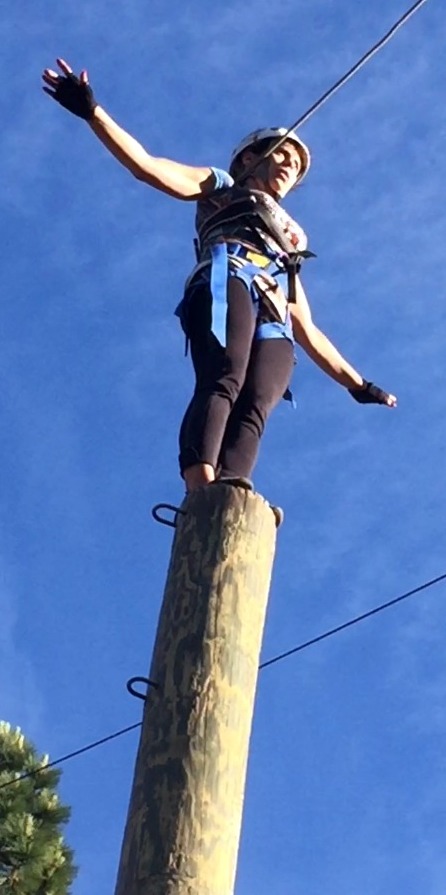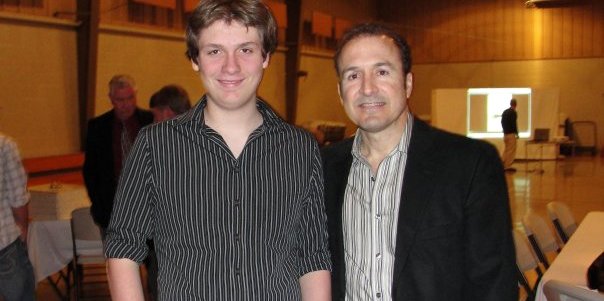Deed Seeds
“To be doing good deeds is man’s most glorious task.”
– Sophocles

Beyond the parochial lessons we learned in childhood about doing good deeds — still valid, and yet perhaps needing more umpfh as an adult — we can consider what we are seeding in our deeding.
How we go into a meeting, a negotiation, a sales call, a group project, or our very day can be shaped by the little and perhaps inconsequential tidbits of blessings we put out just before.
Letting someone climb into traffic in front of us, picking up trash as we walk down the sidewalk, leaving a voicemail for someone saying we’re thinking about them, paying for the customer behind us in the fast food lane, give away an eBook…all of these have the potential for feeling good, generous and overall better about ourselves and, perhaps, more worthy to receive our own good.
We’ve heard these acts carry even more power when done with nobody watching.
Where can you plant deed seeds in your experience of life being good for yourself and others today?
Got deed seeds?
“Thinking good thoughts is not enough, doing good deeds is not enough, seeing others follow your good examples is enough.”
– Douglas Horton
What I Learned About Being Brave From a Dirty Helmet
 The ropes course looked awesome…but the helmet necessary to participate was dusty, filthy and gross. What’s worse, I didn’t have a scarf to put between my hair and the helmet.
The ropes course looked awesome…but the helmet necessary to participate was dusty, filthy and gross. What’s worse, I didn’t have a scarf to put between my hair and the helmet.
I was raised by a neat-freak. Admittedly (ask Darrell), I have those tendencies myself, although in a much lighter form.
I’d never done a ropes course before, and had been excitedly waiting for this day.
The dilemma presented itself: the only way to engage was to put on the helmet.
I’ve heard it said that “if you think your hair is more important than your head, you’re probably right.” However, this was not about vanity. This was about extreme dirt. Remember: neat-freak tendencies.
Yet, I was clear that I would not miss this ropes course.
At that moment, being brave didn’t at all mean walking the tightrope or jumping from a high pole onto a trapeze (all of which I was facing). At that moment, being brave meant putting on that damn helmet!
Outside of my comfort zone? Yes! Already! Before putting one foot onto a pole step or rigging!
Once I made that first “leap” of faith, everything was downhill from there. Crossing rope bridges, diving from poles, ascending vertical obstacle courses to reach new heights…piece of cake.
My takeaway lesson for the day: being brave looks different for everyone. For someone afraid of heights, it’s jumping off a climbing wall. For someone afraid of dirt, it’s donning a dirty helmet. It doesn’t matter what fear we conquer. It just matters that we conquer it.
The helmet course was amazing. Who wants to go?
Playing Dirty
“I’ve missed more than 9000 shots in my career. I’ve lost almost 300 games. 26 times, I’ve been trusted to take the game winning shot and missed. I’ve failed over and over and over again in my life. And that is why I succeed.”
—Michael Jordan

That’s the very reason we don’t take action.
We want to look pretty when, to learn and grow, it requires glaring ugliness.
Waiting until the i’s are dotted, the t’s are crossed, and we’ve diminished all chances of not “looking good” results in empty playing fields…and everyone sitting in the stands.
Playing — even and especially when we aren’t “prepared” — means we are IN the game.
A certain amount of apprenticeship to an idea or plan is respectable. Most, however, use that apprenticeship as an evidentiary stage to prove their incapability.
Too much consideration kills countless ideas and splendid plans.
Where can you drop the cleanliness and jump into the mud of a game today?
Got playing dirty?
“Every day is a new opportunity. You can build on yesterday’s success or put its failures behind and start over again. That’s the way life is, with a new game every day.”
—Bob Feller
Parenting Adult Children (Part 2)
See Part 1 of this story here.

Gone were the days when I could direct his actions. Gone were the days when I could logic/convince/velvetly force him into anything. Gone even were the days where my opinion mattered at all. Though individuation for a growing person begins much younger, I was present to the full brunt of it when he was now out of house and completely out of influence.
Thankfully, I have a dear friend and prayer partner who passed through this phase many years earlier with her two sons and yet was still “writing the book” on parenting of adult children. She called this phase unique in that the kid-come-adult is trying to be an adult – but doesn’t know how – and the parent is trying to not micro-manage their life – but doesn’t know how. It’s a very weird and challenging stage for both young adult and parent alike.
The first bit of wisdom she passed on was to cease all attempts to advise: regardless, whatsoever, notwithstanding anything! Then, the challenge was to simply acknowledge whatever could be acknowledged about the paths, choices, or directions he was taking…”challenge” because, as the parent, we think we know better. The idea was to become an acknowledging and validating machine, and close the mouth of “the wise one”.
What that also meant was being able to hear the need for financial support and stand strong in allowing the necessary path of growth from kid-wanting-to-be-adult to, possibly, actual adulthood. That is a tough one.

There’s a story I once heard about a man who saw a butterfly just beginning its exit from a cocoon. He thought he would aid in the process by using his fingernail to help nick away parts of the cocoon shell so that the butterfly could get out easier. What happened, however, once the shell was eventually removed, was that the “butterfly” became a would-be butterfly because, as the bloated insect lie there with wings full of fluid, there was no way it would ever be able to fly. The very act of having to force itself out of the cocoon was a critical process in squeezing out the fluid so that the wings would be light, airy, and flight-worthy.
Learning to let my son learn what he needs to learn – without meddling one way or the other – is, for me, a big Back Forty growth endeavor.
Yet another more recent bit of evolved advice from my sage veteran parent partner was this: when he tells me something he did that I feel like praising, instead of being the one approving and acknowledging of that action, I am to put it back to him: “How did that make you feel?” This act of turning him toward the source of all approval as being within him vs. my “guidance” slipping in through some side door of “approval” is another way of pulling back so my adult child can become adult.
I’m in no way through this process, and we all know that our kids are our kids for life. Yet going through this requisite phase of Back Forty parenting upgrade is a unique period in which I’m learning just a thing or two about a thing or two.
Parenting Adult Children (Part 1)

One of the many new dimensions of our midlife, The Back Forty, is the necessity to parent differently. I’ve practiced this a great deal over the last several years, as my son went from 17, with an appropriately growing voice in how his life goes, to now being 22.
I was an “involved” parent all through his growing up. Following a divorce when he was 2½, I focused my half-time custody on all the typical things a dad and son would do as he grew: YMCA Indian Guides, AYSO soccer, YMCA swimming (first Guppy, then Minnows, then Sharks), Tai Kwon Do (first Tiny Tigers, then…)…moving as he got older into Cub and Boy Scouts, geckos, rats, fencing, and persistent video game systems (Gameboy, Nintendo, X-Box). Not to mention church on Sundays where he took classes over the course of 12 years. My involvement and guiding direction of my son’s life was strong.
From age 2½ to 7 or so, my parenting was pretty default: play, learn, discipline with timeouts when necessary…but all fairly easy and without thought. Around that time, however, I went through a custody suit lasting a couple years. One of the many blessings that came out of that whole process (from a Back Forty INFUSE Program perspective) was a more conscious study of parenting.
Parenting was different now than in the days of my simple, country upbringing. Plus, I lived in California, in many ways a far-cry skewed mentality than that of my Texas roots. Having come to California specifically for consciousness reasons, I was always on the touchy-feely side of most things anyway. Still, when California new-age consciousness and attitudes about the raising of indigo/millennial/Gen Z individuals come together, parenting looked a lot like coddling to my tainted eyes.

Upon moving out of the parents’ house, however, parental views about how to relate to “adult” kids differ… especially among divorced parents. My own (right or wrong) basic stance was “If you’re going to school, I’m supporting you (financially). If you’re not, I’m assuming you want/need to learn about life…so I’ll support you in that too by letting you support yourself.”
I’ll relieve you of the litany of differences of opinions and challenging interactions a stance like that can take – both with adult child and ex – and yet something became very clear: I needed to find a new way to relate to my son…
To be continued…
Read Part 2 here.
Generation Gap
“Who you are and how you act in the present is given by the future into which you are living.”
–Werner Erhard

Ever accomplish a goal (or not) and have a big blank space in front of you?
Sometimes there’s even a post-featal downturn in mood, when the juice of the previous activity drive has ceased surging without replacement.
It’s then when our best ingenuity is called for: actually creating what comes next.
To generate and invent a future to live into — and then to be empowered (vs. diminished) by the gap that shows up — is the ultimate creativity.
It’s the games people play that create life and living.
Where can you intentionally generate an empowering gap to live into today?
Got generation gap?
“It’s not only moving that creates new starting points. Sometimes all it takes is a subtle shift in perspective, an opening of the mind, an intentional pause and reset, or a new route to start to see new options and new possibilities.”
—Kristin Armstrong
What Rocky Road Ice-Cream Taught Me About Un-Settling

If I am going to use my calories on ice-cream, it’s got to be worth it. Vanilla, Strawberry, Eggplant Madness or Garlic Jalapeño is not worth it. Thrifty’s Rocky Road is worth it.
We recently moved to the sweetest little gem of a micro-town-within-a-metropolis by the sea: the Belmont Shore area of Long Beach, CA. One recent evening, while walking on the happening 2nd street with Darrell, we visited our local Rite Aid for some Thrifty ice cream. I asked for not just my favorite, but my one and only, and the friendly ice-cream clerk, Bill, said they were totally, completely, and utterly out of Rocky Road. The refrigerator was being serviced, and their ice-cream selection was cut in half. Rocky Road was one of the casualties.
While I was recovering from the shock, my dream of a Rocky Road cone fading into abyss, Darrell chose his flavor of the moment. He’s far more flexible on some things than me. And he isn’t thinking calories either.
The ever-helpful Bill tried to tempt me with tastes of other options, but I wouldn’t budge; I was absolutely clear that I was not going to settle for “second best,” and if I couldn’t get the ice cream I wanted, I would have none.
Petulant child? Stubborn adult? Or a woman unwilling to settle for less than what she wants?
As we started to leave, with Darrell busy at work on his cone du jour, Bill asked us to wait for a few minutes, excused himself to “check something” and walked towards the back of the store. He was gone for a while.
This was getting interesting. I hadn’t put up a fuss, or (despite my words here) even copped an attitude. What was he up to?
“Wouldn’t it be wild if he came back with a fresh bin of Rocky Road?” I thought out loud. Darrell raised an eyebrow… “If he does,” I added, “it will be my sign from the Universe to never, ever, settle for anything less than what I really want.”
W. Somerset Maugham said:
“It’s a funny thing about life; if you refuse to accept anything but the best, you very often get it.”
And yes, you guessed it. Bill came back with a fresh, brand new bin of Rocky Road.
I am taking W. Somerset Maugham’s words into my Back Forty. I am excited for an “un-settling” second half of life.
Who is with me?
Big Game Help
“It’s not the load that breaks you down, it’s the way you carry it.”
–Lena Horne

There is much said in our American culture about the self-made man or woman, the iron self-will and resolve that has individuals pull themselves up by their bootstraps, and a lot of ego-oriented “respect” offered to those who, alone, can handle things.
Granted, being able to find the resources, the will and the way within can be of great, holistic and long-term value.
Yet, there’s also a lot said about the power of helping others in their success. Zig Ziglar’s famous quote “You can have everything you want in life if you will just help enough other people get what they want” is an inspiring redirect toward focus upon others.
But search for quotes on “getting help” and you find that 98% are about offering help to others and only the tiny remainder about getting help yourself.
It seems the receiving side of the coin is simply not as respected or valued. We prize offering help, but where’s the equal pride in seeking or obtaining it?
Consider this: if you don’t need help, right now and right where you are, you simply aren’t playing a big enough game.
Got big game help?
“Be strong enough to stand alone, smart enough to know when you need help, and brave enough to ask for it.”
–Ziad K. Abdelnour
You Won’t Believe This New Retirement Craze!

Call it what you like – phased retirement, gradual retirement, or flexible retirement – but this craze is only just beginning!
In one of my previous posts I talked about the trend of staying in the workforce longer (Read it here). Basically, I explain that the historical concepts of retirement are becoming more and more out of date. The most obvious reason is the fact that, in the past few generations, the average life expectancy has increased by almost 30 years!
With people living longer, healthier lives, it’s no wonder why they are choosing to stay in the workforce longer. Since we are living longer, the money we save for retirement has to last longer. This causes two effects. One, we need to save more money. Two, we need to work longer. Usually, our solution includes a mixture of those two options.
This is what leads us to the new craze in retirement.
Phased Retirement as I call it (although you may call it whatever you wish), is how the world is evolving to change the historical concept of retirement to meet the needs of this age.
Let me walk you through this relatively new concept that is changing how people, companies, and our government is thinking about retirement.
There is currently a process that people go through when they choose traditional retirement, or “cliff retirement”.
For about 3 years before retiring, you are extremely excited about the concept (especially if your current job is stressful). The first year of retirement is extremely stressful. Once you make the plunge you realize that your new schedule lacks in some key areas. Your built in social network from your job is now gone, your previous identity tied to your career is also gone, not to mention that you often feel as if your new life lacks structure and purpose.
However, the next few years of retirement get better. You find yourself in the “honeymoon phase” of retirement when you find new activities and social groups to become a part of. After the honeymoon phase wears off, you will begin feeling like your routine is boring. Finally, after your discontent wears off, you become content with your retired life.
If this doesn’t sound ideal to you, you’re not alone!

This is why phased retirement is becoming so popular. Very few people want to sit around and watch TV all day after they retire, it’s partially what is pushing so many people to continue working long after the standard retirement age.
Phased retirement gives you the ability to relieve some of the financial burden of retirement, reduce the stress of retirement, enhance your personal fulfillment, and keep ties with your social network through your job, while still giving you time for retirement activities like traveling and spending time with family. Ultimately, phased retirement gives you the time you need to prepare for retirement both financially and emotionally.
At this point you might be thinking, “this is sounding like a great idea, but how do I even start?” Well that’s the thing. While phased retirement also helps employers combat the shortage of employees once boomers start to retire and while the IRS is considering regulations to establish guidelines for creating and administering phased retirement programs, only 6% of companies currently have formal phased retirement systems in place.
However, don’t fear, because I have some tips and tricks for negotiating a phased retirement with your company regardless of if they have any systems in place.

Phased Retirement Helps Your Company
By phasing out of your company, you are giving your supervisor plenty of time to find needed replacements. You are also helping your company cut costs while keeping your unique knowledge at their disposal. Here are a few tips for negotiating a new phased retirement schedule with your supervisor:
-
Offer to work during busy times for your company or when the workload is heavy. Depending on your job, this might be seasonal, during peak hours each day, or on certain days of the week.
-
Offer to mentor younger employees. The last thing your company wants is to lose all of the knowledge you have gained over the years working for them. By mentoring a younger employee (potentially to take your place) your company can be ensured that your eventual retirement will be a smooth transition.
Before Talking to Your Supervisor, Research These Things!
Don’t run into your supervisor’s office before doing your research. Look into the topics below so that you can come up with a solidified plan before reaching out to your supervisor.
-
Watch out for pension/retirement fund problems. Make sure that decreasing your salary won’t adversely effect your pension. If your pension is based on your income over your last five years of work, cutting your salary isn’t the best idea. If this is how your pension is set up, consider “retiring” from your current job on schedule and picking up a new part-time job to transition into retirement.
-
Check the minimum requirements for full health coverage for your company. If you are under the age of 65 (aka, you don’t qualify for medicare) you want to make sure that you will still be working enough hours to receive your full benefits.
-
Look into Social Security withholdings. This is the most complicated step, but don’t worry, I’ve got you covered. First of all, it is important for you to know that you can work and still receive Social Security benefits! That being said, if you are making “too much” for your age bracket things can get a bit more complicated. Before getting into the details, let me give you one extra tip. You will need to know your “full retirement age” according to the Social Security Administration. Click here to calculate your “full retirement age” now. Now that you know your “full retirement age” look below to see where you might fall when you retire and how to best utilize your Social Security Benefits:
-
If you are shifting to phased retirement between the ages of 62 and your “full retirement age”: you can earn $15,720 in 2016 without being penalized. If you are making more than that, it isn’t necessarily a cause for alarm. For each dollar you make above that maximum, Social Security will withhold 50 cents.
-
Once you reach your “full retirement age”: you can earn up to $37,680 per year. If you are making more than that, your penalty goes down to 33 cents for each extra dollar earned.
-
Once you are above your “full retirement age”: you can earn as much as you like with no more penalties or withholding’s.
-
Now, here is the really good news. If you fall into one of the situations where part of your income is being withheld by the Social Security Administration, you will get it back once you are above your “full retirement age”! Once you reach that age, your social security check will be recalculated to give you credit for all of the previously withheld payments! (If you have any more questions about how your Social Security is effected when you start to retire, their website is full of useful information!)
Now that you have done your research, you are ready to talk to your supervisor.

Negotiate Your New Schedule With Your Supervisor
-
Choose your responsibilities carefully. Make sure that you aren’t just “giving up” the responsibilities that you don’t enjoy. Think about which of your responsibilities are the most important for the company. Also, which responsibilities currently need to be required during times when your new schedule might not have you at the company. Set up a schedule to slowly start giving up responsibilities (starting with the ones that require the least extra training for whoever takes those responsibilities over). This is made easier if you are mentoring your eventual replacement.
-
Settle on fair pay. Keep in mind that you are working less. You might have to give up some of your full-time perks as well as some of your income. Don’t be shocked if you’re asked to give up your parking spot right in front. Remember that you are trading your extra income and perks for more personal time to do what you enjoy. Think about what perks are the most important to you as well as how much you should be compensated for your new schedule.

Now you are ready to start your phased retirement journey! The only thing left to do is decide how to enjoy your extra time off!
Sources:
The United States Social Security Administration
WKOW 27: “Gradual Retirement” Growing Across Wisconsin
The Gazette: The “New Retirement” and Why to Try It
U.S. News Money: How to Retire Gradually
AARP: Phased Retirement and Flexible Retirement Arrangements
Happy Resolve
“Most folks are as happy as they make up their minds to be.”
– Abraham Lincoln

Stuff happens. It will keep happening. There’s nothing we can do to stop stuff.
How we are with others — but most importantly, with ourselves — in the midst of stuff either brings more stuff or requalifies stuff.
Anything, ANYTHING AT ALL can either be a blessing or a curse. It’s just how hard we’re willing to work toward the blessing end of the spectrum.
When all evidence is to the contrary is when real musculature is formed.
Got happy resolve?
“Your success and happiness lies in you. Resolve to keep happy, and your joy and you shall form an invincible host against difficulties.”
– Helen Keller







